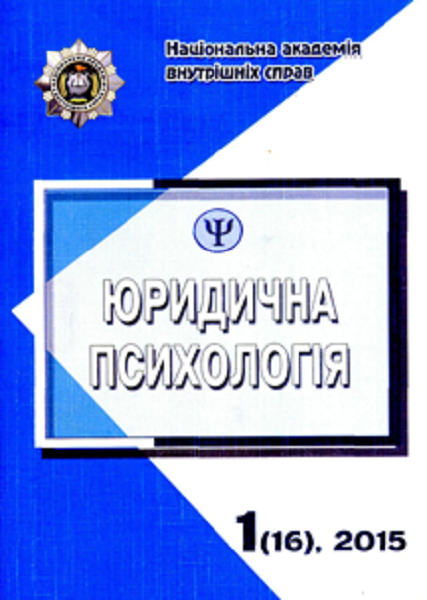The psychological mechanisms of fraud
Abstract
Recently in Ukraine fraud has increased and is characterized by the change of shapes, types and methods. The development of new technologies, the deep economic and social crisis in our society, legal instability create ample opportunities for the rapid development of this type of crime. Specified causes special attention of scholars and practitioners in the study of this phenomenon.
According to the criminal code of Ukraine fraud is the acquisition of another’s property or the acquisition of the right to property by deception or abuse of trust.
Improvement of the activity of law enforcement authorities in the investigation of acquisitive crimes, including fraud attacks, improving the quality of investigation of such crimes, in addition to the criminal, criminal-legal and criminological research, depends on the implementation of knowledge in psychological science. Importance of the study of the factors contributing to the successful implementation of fraudulent intent. We are talking about the study of the personality of the offender, the degree of possession of the methods and techniques of criminal manipulation, and study of the psychological characteristics of victims of fraudulent attacks.
The identity of the modern fraudster has specific features as kernel-level personality and specific psychological characteristics.
The scammers used the technology of the psychological impact on potential victims using a variety of methods aimed at the manipulation of consciousness.
Downloads
Abstract views: 387 PDF Downloads: 160
- Authors reserve the right to authorship of their own work and transfer to the magazine the right of the first publication of this work under the terms of the Creative Commons Attribution License, which allows other persons to freely distribute published work with mandatory reference to authors of the original work and the first publication of an article in this magazine.
- Authors have the right to enter into separate additional agreements on non-exclusive dissemination of the work in the form in which it was published in the journal (for example, to post an article in the institution's repository or to publish as part of a monograph), provided that the link to the first publication of the work in this journal is maintained.
- The journal's policy allows and encourages the posting of articles by authors on the Internet (for example, in electronic storehouses of institutions or on personal websites), both before the submission of this manuscript to the editorial office and during its editorial processing, as this contributes to the creation of a productive scientific discussion and positively affects the efficiency and dynamics of citing the published work.




